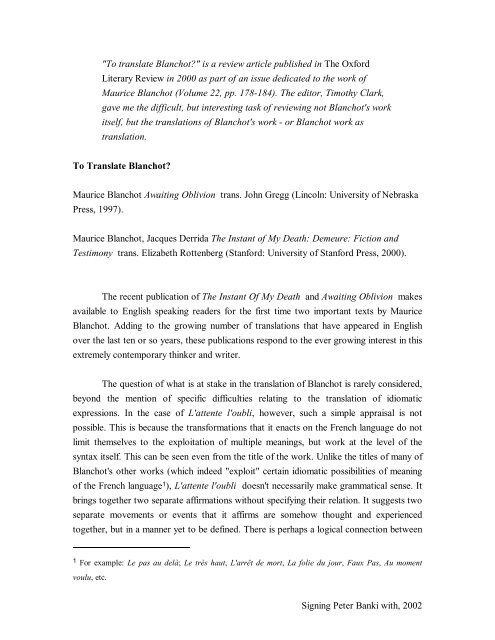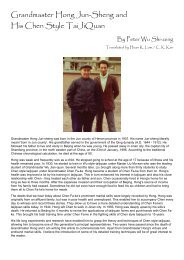To Translate Blanchot-
To Translate Blanchot-
To Translate Blanchot-
Create successful ePaper yourself
Turn your PDF publications into a flip-book with our unique Google optimized e-Paper software.
"<strong>To</strong> translate <strong>Blanchot</strong>?" is a review article published in The Oxford<br />
Literary Review in 2000 as part of an issue dedicated to the work of<br />
Maurice <strong>Blanchot</strong> (Volume 22, pp. 178-184). The editor, Timothy Clark,<br />
gave me the difficult, but interesting task of reviewing not <strong>Blanchot</strong>'s work<br />
itself, but the translations of <strong>Blanchot</strong>'s work - or <strong>Blanchot</strong> work as<br />
translation.<br />
<strong>To</strong> <strong>Translate</strong> <strong>Blanchot</strong>?<br />
Maurice <strong>Blanchot</strong> Awaiting Oblivion trans. John Gregg (Lincoln: University of Nebraska<br />
Press, 1997).<br />
Maurice <strong>Blanchot</strong>, Jacques Derrida The Instant of My Death: Demeure: Fiction and<br />
Testimony trans. Elizabeth Rottenberg (Stanford: University of Stanford Press, 2000).<br />
The recent publication of The Instant Of My Death and Awaiting Oblivion makes<br />
available to English speaking readers for the first time two important texts by Maurice<br />
<strong>Blanchot</strong>. Adding to the growing number of translations that have appeared in English<br />
over the last ten or so years, these publications respond to the ever growing interest in this<br />
extremely contemporary thinker and writer.<br />
The question of what is at stake in the translation of <strong>Blanchot</strong> is rarely considered,<br />
beyond the mention of specific difficulties relating to the translation of idiomatic<br />
expressions. In the case of L'attente l'oubli, however, such a simple appraisal is not<br />
possible. This is because the transformations that it enacts on the French language do not<br />
limit themselves to the exploitation of multiple meanings, but work at the level of the<br />
syntax itself. This can be seen even from the title of the work. Unlike the titles of many of<br />
<strong>Blanchot</strong>'s other works (which indeed "exploit" certain idiomatic possibilities of meaning<br />
of the French language 1 ), L'attente l'oubli doesn't necessarily make grammatical sense. It<br />
brings together two separate affirmations without specifying their relation. It suggests two<br />
separate movements or events that it affirms are somehow thought and experienced<br />
together, but in a manner yet to be defined. There is perhaps a logical connection between<br />
1 For example: Le pas au delà; Le très haut, L'arrêt de mort, La folie du jour, Faux Pas, Au moment<br />
voulu, etc.<br />
Signing Peter Banki with, 2002
the two: waiting presupposes forgetting; forgetting presupposes waiting. Or otherwise,<br />
perhaps, there is a temporal hiatus: there is waiting, then there is forgetting. (Note: the<br />
text is separated into two parts.)<br />
In this regard, the decision to translate the title as "Awaiting Oblivion" is<br />
unfortunate. If <strong>Blanchot</strong> had meant "Awaiting Oblivion", he would have entitled the work<br />
"L'attente de l'oubli", or rather, "En attendent l'oubli". The translator has tried to make<br />
sense out of something which suspends the movement of making sense, or, in any case,<br />
leaves it undecidable. 2 Awaiting Oblivion hides the suspension of the title which is<br />
(paradoxically) marked by the absence of grammatical marks, leaving only a rhythm, the<br />
rise and fall of a cadence, with stress on the first syllable of each word: L'attente l'oubli;<br />
Waiting Forgetting. 3<br />
Now L'attente l'oubli is certainly one of <strong>Blanchot</strong>'s most obscure, even painfully<br />
obscure books. Like the syntax, the narration interminably rolls over itself in oxymorons<br />
and ever more subtle displacements that relentlessly disturb the sense of what is being<br />
recounted. The anonymous characters (like the narrative itself) are no more than minimal<br />
devices that scarcely frame the research that approximates a series of notes. One can<br />
certainly argue (faithful to <strong>Blanchot</strong>'s interpretation of literature) that before a text such as<br />
this one cannot not lose one's footing, and that furthermore it is necessary to do so in<br />
order to have some sort of relation to it. How then to interpret the task of the translator if<br />
2 For the difference between polysemy and undecidability of meaning, see J. Derrida "Mallarmé" in Acts<br />
of Literature Derek Attridge (ed.) (New York: Routedge, 1992), pp. 114f.<br />
3 The decision to translate "awaiting" for L'attente is quite deceptive, because, as the text makes clear,<br />
l'attente at the limit is not the waiting for anything in particular. Its interest resides in the fact that<br />
ultimately it has no object: "As soon as one waited for something, one waited a little less." (p. 10) The<br />
decision to translate "oblivion" for l'oubli in the title is also noteworthy. Significantly, Gregg never<br />
translates l'oubli as "oblivion" in the text itself (where it frequently appears), and in the "Translator's<br />
Introduction" he makes no attempt to account for this inconsistency. Of course, the issue is that "oblivion"<br />
is a state, whereas "forgetting", a present participle, implies movement. While there are indications in the<br />
text that l'oubli might resemble a state for <strong>Blanchot</strong>, (he speaks of "its immobile presence" (p. 45)), this<br />
immobility is extremely active: L'oubli is the "breath" which speaks in advance in every word (p. 46); it<br />
gives death while permitting to turn away from death (p. 46); it is the detour and initiative (l'allant) in<br />
immobile waiting (p. 47).<br />
Signing Peter Banki with, 2002<br />
Page 2<br />
2
the understanding of the meaning of the work cannot be assured? Indeed must one<br />
understand a work in order to translate it well?<br />
<strong>Blanchot</strong> himself gives the rule, if not specifically for the translation of his own<br />
works, then for the task of the literary translator more generally. In a short text on<br />
Benjamin simply entitled "Translating" (Traduire), <strong>Blanchot</strong> argues that when directed<br />
towards works of literature the translator's task does not relate primarily to the signified<br />
meaning of the work, but to the alterity of the work with respect to the language in which<br />
it is originally written. Following Benjamin, he argues against literality and resemblance of<br />
the original as governing criteria (these are seductive traps in which something essential is<br />
lost.) Rather, by utilising the difference of languages, it is the translator's task "to awaken<br />
in his own language a presence of what is different, originally in the original". 4 This is the<br />
literary inventiveness of his work, its singular originality, to make visible in his own<br />
language what makes the work always other. (Incidentally, this untranslatability of the<br />
original with regard to its own language is also the condition for it to be worthy of being<br />
translated in the first instance: "either because it originally makes a gesture towards<br />
another language or because it assembles, in a manner that is privileged, the possibilities<br />
of being different from itself or foreign to itself, which any spoken language has". 5 )<br />
This elegant formulation of the translator's task in fact shelters a double and<br />
contradictory exigency: not only must the translator (as is well understood) measure the<br />
untranslability of the original, but must translate this untranslatability in such a way as it<br />
remains untranslatable in his own language. Now it must be said that this may not be<br />
possible, except perhaps on very rare occasions, and as <strong>Blanchot</strong> himself intimates, not<br />
without treachery and madness. 6 In his "Translator's Introduction", John Gregg notes that<br />
in L'attente l'oubli <strong>Blanchot</strong> often strings together words of the same root but that<br />
function grammatically as different parts of speech:<br />
4 M. <strong>Blanchot</strong> Friendship trans. Elizabeth Rottenberg (Stanford: Stanford University Press, 1997) p. 59.<br />
5 ibid. It is worth underlining the fact that when referring to the translator <strong>Blanchot</strong> employs the universal<br />
masculine pronoun (as is always the case in his critical essays). Given the extreme importance of women<br />
and the feminine affirmation in his literary work, it is not without irony that in this regard he conforms to<br />
the French milieu from where and for whom he generally writes.<br />
6 "[I]n the end, translating is madness." ibid. p. 61.<br />
Signing Peter Banki with, 2002<br />
Page 3<br />
3
Attendre, se rendre attentif à ce qui fait de l'attente un acte neutre, enroulé<br />
sur soi, serré en cercles dont le plus intérieur et le plus extérieur coïncident,<br />
attention distraite en attente et retournée jusqu'à l'inattendu. (p. xii)<br />
In a quasi-Heideggerian gesture - one that is, one might say, idiomatically translated into<br />
French - <strong>Blanchot</strong> links the experience of waiting (attendre) to that of making oneself<br />
attentive (attentif), and then to distracted attention (attention distraite), which in the same<br />
sentence is turned back to the unexpected (l'inattendu). The shared etymological<br />
foundation of these words becomes the sediment of a movement of thought which allows<br />
<strong>Blanchot</strong> to testify in his own way to an exemplary experience - one that remains as if en<br />
attente, in abeyance in all experience. 7<br />
Strictly speaking, this specific use of language is not translatable into English (any<br />
more than it could be written otherwise in French). The shared Latin etymology which<br />
overdetermines the words' relation to one another and thus the meaning of the passage as<br />
a whole is not reproducible outside Latin languages. Moreover, different words in the<br />
same language - even if they could convey the same signified meaning - would also<br />
necessitate the loss of the shared Latin root.<br />
The question of loss is usually the most compelling question in the translation of a<br />
literary text - indeed in any translation when the language is idiomatic or otherwise<br />
"untranslatable". In <strong>Blanchot</strong>'s conception of the translator's task, there is, on the one<br />
hand, an acceptance that the alterity of the original with regard to language in which it is<br />
written cannot be reproduced in the same way in translation. On the other hand, he<br />
maintains that there is the possibility that that alterity can be re-invented - or rather re-<br />
7 It is important to note that the first version of L'attente l'oubli was published in a Festschrift<br />
commemorating Heidegger's seventieth birthday. Timothy Clark suggests that some of L'attente l'oubli is<br />
"practically a French translation of fragments from Heidegger". See T. Clark Derrida, Heidegger,<br />
<strong>Blanchot</strong> : sources of Derrida's notion and practice of literature (Cambridge: Cambridge University<br />
Press, 1992.) pp. 48-9, 90-93, 105-107. While there is a clear resemblance between some of <strong>Blanchot</strong>'s<br />
formulations on waiting and those of Heidegger (as well as the shared employment of a similar form, that<br />
of dialogue), <strong>Blanchot</strong> has nonetheless made additions and alterations - be they subtle. For my purposes<br />
here, I simply wish to draw attention to the quasi-Heideggerian manner in which <strong>Blanchot</strong> interprets and<br />
re-inscribes Latin etymology as a sediment of thought, translating, one might say, "thought" into<br />
literature.<br />
Signing Peter Banki with, 2002<br />
Page 4<br />
4
invent itself - in a completely different way. The inevitability of loss is accepted, not<br />
negated, yet the possibility that the loss is not simply a loss is also kept open: ideally the<br />
translation is the re-invention of the originality of the original. 8<br />
The Instant of My Death is of itself the translation of an untranslatable experience -<br />
that of a marvellous feeling of lightness - an experience whose very untranslatability it<br />
scrupulously respects:<br />
There remained (Demeurait), however, when the shooting was no longer<br />
but to come (n'était plus qu'en attente), the feeling of lightness that I<br />
would not know how to translate: freed from life? the infinite opening up?<br />
Neither happiness, nor unhappiness....I know, I imagine that this<br />
unanalyzable feeling changed what there remained for him of existence. (p.<br />
9)<br />
The Instant of My Death translates this unanalyzable experience into a personal testimony<br />
in the French language, the testimony of a young man caught by the Nazis and subjected<br />
to an order of immanent execution. Derrida's reading (also translated by Elizabeth<br />
Rottenberg in the same volume) analyses the untranslatable manner in which <strong>Blanchot</strong><br />
employs the terms instant/instance and demeure/demeurer. The instant of death to which<br />
the title refers is the instant of death en instance, the instant at once in immanence and in<br />
abeyance, about to take place but on hold, because the instant of death itself is impossible<br />
as such, or, in any case, inaccessible to autobiographical testimony. The young man<br />
experiences the en instance of his death as the instant of his death because at that<br />
8 While <strong>Blanchot</strong>'s understanding differs markedly from Benjamin's, it can be argued that the messianic<br />
element is still present, not as the intimation of the "pure language" (reine Sprache) in which the different<br />
modes of intention proper to each language are reconciled, but in the ideal of translation in which the<br />
alterity of the original with respect to the language in which it is written is still visible. Interestingly, this<br />
is what Benjamin rejects: "the relationship between content and language is quite different in the original<br />
and the translation...[T]ranslation, ironically, transplants the original into a more definitive linguistic<br />
realm since it can no longer be displaced by a secondary rendering." (W. Benjamin "The task of the<br />
Translator" in illuminations trans. Harry Zohn (New York: Schocken Books) p. 75) If a translation were<br />
successful by <strong>Blanchot</strong>'s criteria, it would in turn be worthy of translation and therefore no longer simply a<br />
translation. In other words, <strong>Blanchot</strong>'s position implies a self-deconstruction of the relation between the<br />
original and the translation.<br />
Signing Peter Banki with, 2002<br />
Page 5<br />
5
moment it is no longer a question of possible survival, the distinction between life and<br />
death is no longer pertinent. At that moment - à cet instant - the instant of death in its<br />
supposed unicity and truth is divided and put under erasure because he is at once living<br />
and dead, experiencing what he isn't in fact experiencing.<br />
The expression en instance also resonates in French with the senses of insistence,<br />
juridical authority and example which all come together in the final sentence of the text<br />
which speaks of the instant of death as from now on always en instance:<br />
All that remains (Seul demeure) is the feeling of lightness that is death itself<br />
or, to put it more precisely, the instant of my death henceforth always in<br />
abeyance (l'instant de ma mort désormais toujours en instance) (p. 11).<br />
<strong>Blanchot</strong> seems to be saying here that from now on death can no longer happen to him.<br />
Death can most certainly happen, indeed will happen, but it can no longer happen to him<br />
as a living/dead "subject". What remains, in fact all that remains, is the feeling of lightness,<br />
the memory-trace of his death. The lightness remains - demeure: a complicated word,<br />
untranslatable because of the resonance of death and dying (je meurs, tu meurs). The<br />
lightness dies/undies - de-meure - permanently abides as the insistence and persistence of<br />
the instant of death en instance. Despite appearances, this abiding - demeurance, or even<br />
as Derrida suggests, demourance - is not the permanence of a timeless eternity or an<br />
eternal present, but the permanence of an anachronic remainder, necessarily out of<br />
measure with the time he has to live: the immanence/abeyance of a death that has already<br />
taken place.<br />
This anachronic remaining, dying/undying (demeurance) of his death which is<br />
marked by the feeling of lightness is irreducible to the logic of death, if by death one<br />
understands a simple absolute end without remainder, without demeurance. By virute of<br />
this demeurance, death is not negated, but complicated, be it in his own memory or in<br />
those to whom he testifies (or as a written trace - or any trace). <strong>To</strong> this extent, <strong>Blanchot</strong>'s<br />
testimony can be understood as a belated, godless, politico-philosophical response to the<br />
nihilism of the Nazis, indeed to any nihilism, which, by virtue of a commitment to the idea<br />
of a simple absolute end (a final solution, for example) sanctions senseless destruction with<br />
impunity. For even if <strong>Blanchot</strong> had been killed at that instant, according to the logic of the<br />
testimony the demeurance still would have taken place, which is to say something that<br />
Signing Peter Banki with, 2002<br />
Page 6<br />
6
outlives his life and is incommensurable with it. (The word demeure in French also has the<br />
sense of a legal order or instruction.)<br />
Derrida's reading of The Instant of My Death is not simply a commentary on<br />
<strong>Blanchot</strong>'s text, it also participates in its translation - at once into French and into English.<br />
Included in the same volume, it accompanies the translation of Elizabeth Rottenberg<br />
whose provisional character is marked by the fact that it also includes the republication of<br />
the French original. Derrida explores - even gets carried away with - the untranslatable<br />
character of <strong>Blanchot</strong>'s text, which it analyses as it extends and even supplements (most<br />
significantly with the term demourance as a translation of demeurance). The<br />
untranslatable is the passion of the singular, the irreplaceable - what remains (demeure) of<br />
it in language. The Instant of My Death as the testimony of an exemplary encounter, of a<br />
migration without return, can be read as an allegory of translation in general.<br />
Signing Peter Banki with, 2002<br />
Page 7<br />
7
















